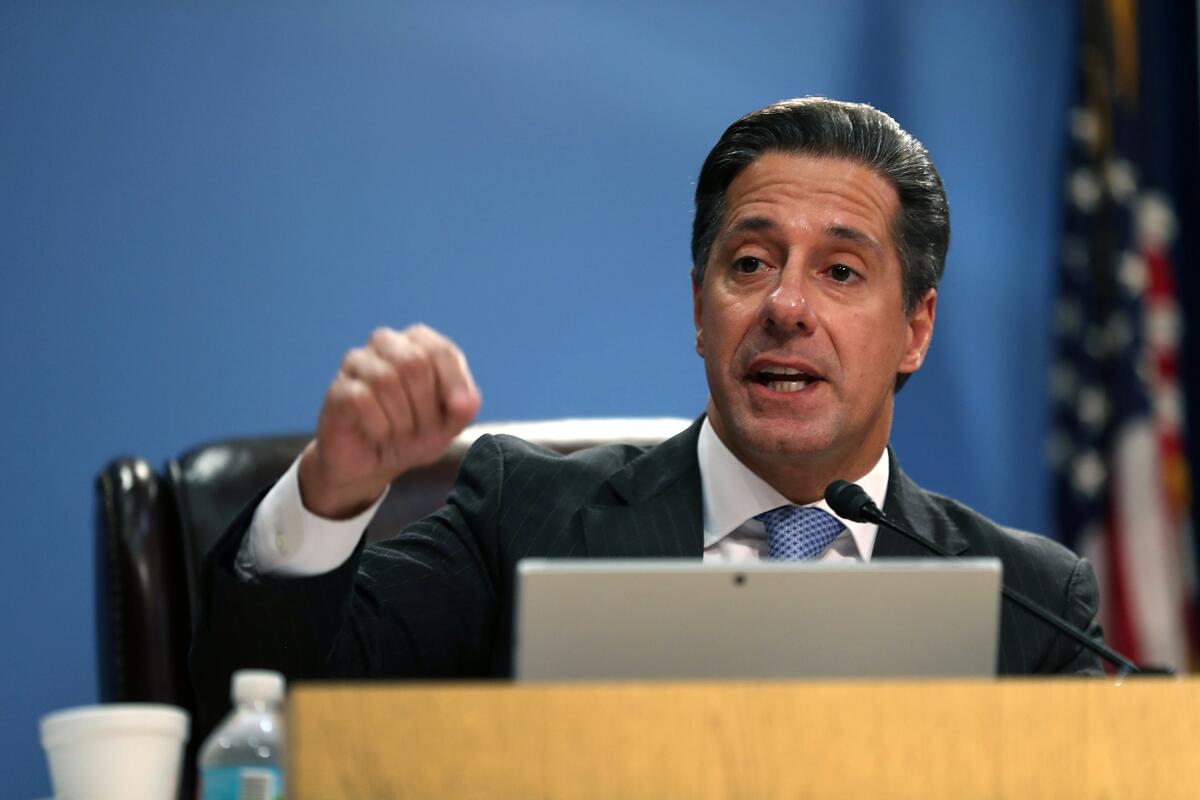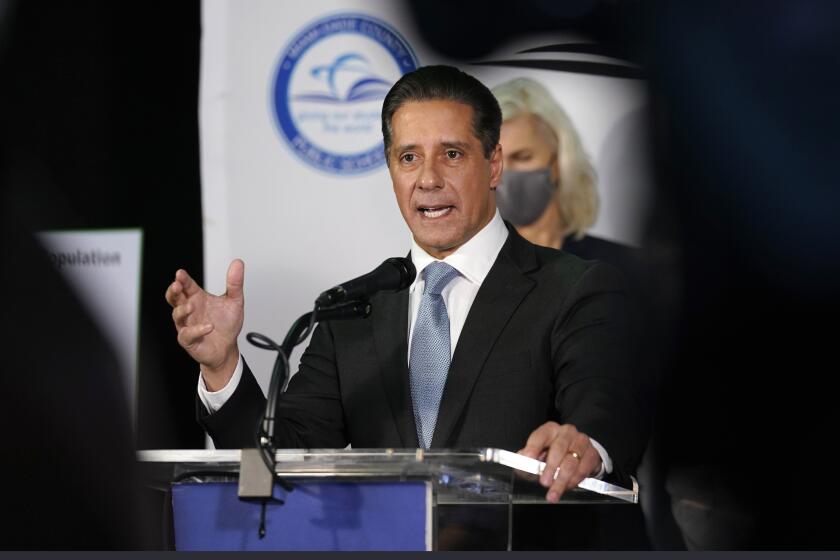Alberto Carvalho, head of Miami-Dade schools, is pick for L.A. superintendent
New LAUSD Supt. Alberto Carvalho must face students’ academic and emotional setbacks from the pandemic and long-term financial and enrollment worries.
Alberto Carvalho, who has led Miami-Dade County Public Schools since 2008 and is among the nation’s most experienced and admired school district leaders, has been named the next superintendent of the Los Angeles Unified School District, district officials announced Thursday.
In coming to L.A. Unified, Carvalho, 57, moves from heading the fourth-largest K-12 public school system in the country to the second largest, taking on one of the highest-profile and most challenging posts in public education.
“It has been the privilege of my life to serve as superintendent of Miami-Dade County Public Schools,” Carvalho said in statement released by L.A. Unified. “For the last three decades, I have selflessly dedicated my professional career to the children of Miami’s diverse community, and I am hoping to bring that same passion, compassion and commitment to the students and families in L.A. Unified.”
Carvalho is credited in the Miami-Dade district with providing stable leadership and improved academic performance, and with creating special programs that offer more schooling choices for parents. In Los Angeles, he would immediately have to confront a school district in which many students have long struggled to achieve and were further set back — academically and emotionally — by the COVID-19 pandemic.
Alberto Carvalho has led Miami-Dade County Public Schools, the nation’s fourth-largest district, since 2008.
“Alberto Carvalho brings the deep experience we need as an educator and leader of a large urban district to manage L.A. Unified’s ongoing response to and recovery from the COVID-19 pandemic,” Board of Education President Kelly Gonez said. “He established a clear record of positive student outcomes and has relentlessly worked toward greater equity for historically underserved communities. I know he will continue that focus in Los Angeles.”
The vote to begin contract negotiations with Carvalho was 7 to 0. The board hopes to approve a contract next week.
In enticing Carvalho to change coasts, the Los Angeles Board of Education accomplished something that New York City — the nation’s largest school system — could not. In 2018, Carvalho agreed to take the New York job, then backed out one day later on live TV, announcing his decision to stay in Miami.
Carvalho was chosen from a field of candidates that sources said included well-regarded insiders with significant leadership experience, notably interim Supt. Megan Reilly, Chief Academic Officer Alison Yoshimoto-Towery and regional administrator Frances Baez. Joan Sullivan, chief executive of the nonprofit Partnership for Los Angeles Schools, which operates 19 campuses under contract with L.A. Unified, also was considered to be among the group.

But it would be hard to match the resume or experience of Carvalho, viewed in South Florida as a charismatic leader with a trophy case that includes multiple “superintendent of the year” awards from various national and Florida organizations. His district also won the 2012 Broad Prize for Urban Education — signaling a thumbs-up from the late Eli Broad and other critics of traditional school systems.
The Miami-Dade district’s grade on the state’s accountability system has risen to an A.
One of Carvalho’s accomplishments has been surviving in the job for more than an entire generation of K-12 students. The tenure of urban superintendents typically lasts three years or less.
Since Roy Romer’s departure in 2006, L.A. Unified has had eight school chiefs, including interim office holders. Former Supt. Austin Beutner stepped down in June at the end of his three-year contract, in part citing exhaustion after managing through a teacher strike and a pandemic. Reilly has served as interim leader since that time.
Carvalho’s success stories — and low points — have been chronicled repeatedly in Florida newspapers and media.
Born in Portugal, he came to the U.S. at age 17. Carvalho learned English as a young adult and quickly worked his way up from construction and restaurant jobs as he attended Broward Community College. He later won a scholarship to Barry University and enrolled on a premed track. He excelled academically, but took a hard turn in his career path when, in his mid-20s, he interviewed for a teaching position at Miami Jackson Senior High. He was offered a job the same day, a Tampa Bay Times profile reported in 2019.
After four years in the classroom — teaching physics, chemistry and calculus — he became an assistant principal. The superintendent at the time was so impressed that he brought Carvalho to work downtown without his having been a principal. Carvalho oversaw federal programs and later became the district’s chief communications officer. He gained further experience by overseeing grant administration and lobbying state officials.
Under Supt. Rudy Crew, Carvalho launched several initiatives, including a Parent Academy and a School Improvement Zone, focusing on schools with low academic achievement.
After becoming superintendent, Carvalho eventually filled a gap in his resume, serving as a principal. He put himself at the helm of a new campus called iPrep Academy, a pre-kindergarten-to-12th-grade magnet school “designed to promote respect and responsibility among the students and staff,” according to its website. All students are required to take honors classes.
Los Angeles education leaders and advocates generally expressed enthusiasm over the selection of a veteran educator with a national reputation for school innovation who began his career as a classroom teacher.
“Importantly, he views English learners not primarily as students who lack English fluency but as the children of immigrants with the rich hopes, dreams and aspirations that immigrant families have always brought to this country,” said Patricia Gandara, a professor of education at UCLA and an expert on English learners, who make up nearly 20% of district students.
Eighth-grade English teacher Joni Bader also was hopeful.
“As an educator, I am thrilled to have a leader who has served in the classroom and as a principal appointed to head our district,” said Badar, who teaches at White Middle School in Carson. “It is essential that our new superintendent listens to and works alongside teachers.”
His career and personal life also have had low points, including two divorces and a bankruptcy, according to a 2008 profile in the Miami Herald. And just as Carvalho began his tenure leading Miami-Dade, embarrassing personal emails surfaced between him and an education beat reporter. The emails dated from a period before his selection as superintendent.
The new schools chief will take over the L.A. job at a critical moment. The system is flush with billions of dollars in coronavirus relief aid, additional federal funding and surging state tax revenues. But there is mountainous work ahead. The isolation and deficiencies of remote learning have been followed by a challenging readjustment to campus. The district also is beset with declining enrollment and a long-term structural budget deficit.
“The last 21 months have been devastating for so many of the families we serve in L.A. Unified,” Gonez said in a recent interview, before the selection of Carvalho. “The pandemic has delivered an unequal burden of illness, death, job loss and trauma that has disproportionately fallen on communities of color. Our superintendent will need to reckon with the profound impacts of the pandemic, the uprisings for racial justice, and the urgent needs of our students and families.”
More than 90% of parents, community members and employees said in a recent district survey that they want the next superintendent to have “experience working in public schools as a teacher and/or administrator.” At nearly the same rate, those who responded also called for someone who has experience “working in and with large, diverse communities” and “managing a very large organization in transition.”
Board member Jackie Goldberg, who described herself as “overjoyed,” said the choice aligns with the community’s expressed priorities: “We unanimously chose an individual who has been a teacher, principal and superintendent of a major school system.”
Carvalho also will enter as an outsider with a fresh perspective. He will need to master quickly the workings and personnel of a massive, complex system with a governing structure much different from Florida’s. L.A. Unified is the nation’s only school system with a paid, full-time Board of Education, where individual members select and direct their own staff.
In making its decision, the school board went in a different direction than in 2018, when, by a 4-3 vote in closed session, members opted for Beutner, a businessman with no education management experience.
Early on, Carvalho will need help from the insiders who did not get picked.
Reilly, the interim superintendent, has management experience both outside and inside education and a solid command of the district’s financial structure. But she’s never been a public school teacher or principal, which helped to open the door for other applicants. Yoshimoto-Towery has extensive leadership experience in academic matters and has been crafting the learning initiatives that are now underway.
Baez has been in the district more than 25 years, rising from teacher to administrator — recently becoming superintendent for Local District Central, one of six regional branches of L.A. Unified. Sullivan is well known in the philanthropic community and has experience trying to turn around some of the district’s schools whose students have struggled the most.
More to Read
Sign up for Essential California
The most important California stories and recommendations in your inbox every morning.
You may occasionally receive promotional content from the Los Angeles Times.















